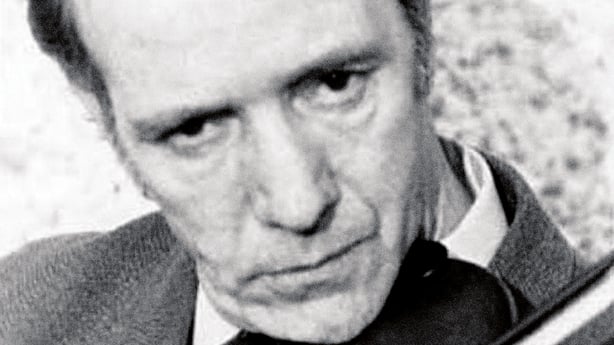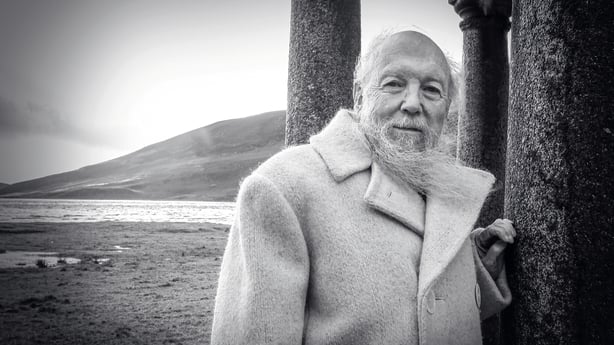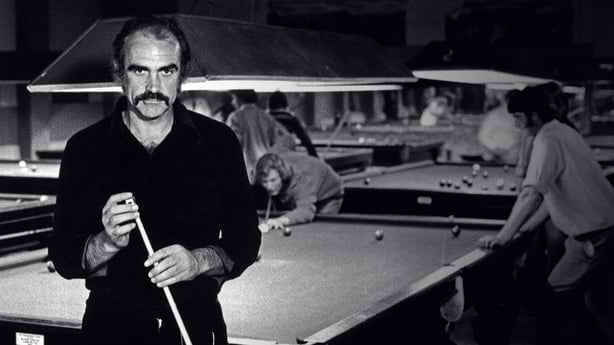We present an excerpt from Real to Reel: Claddagh Records & Garech Browne, the new book by James Morrissey.
Real to Reel celebrates the life of Guinness heir Garech Browne and his quest to preserve Ireland's musical and spoken-word heritage through Claddagh Records, which he founded in 1959.
Seán Connery loses track of time
Tommie Potts was born in 1912 and grew up in The Coombe, then an impoverished area of Dublin. A devout Catholic, he had been taught that pride was one of the 'seven deadly sins', the sin from which all others arise. Garech Browne believed that this was the main reason the fiddle player was so reluctant to be recorded: "I think Tommie was happiest when he was playing music on his own." His father, a native of Bannow, County Wexford, was, according to Tommie: "…an ardent enthusiast of Irish traditional music... throughout the 1920s and into the 1930s our home was frequently visited by musicians from many parts of the country. They held my father in high esteem and described him as a piper of great taste."
Tommie started playing the pipes and fiddle at the age of fifteen and admitted years later that he preferred a free-flowing style of playing, accepting, but not totally adopting, sheer precision:
"I certainly did agree entirely with the basic structure, but this hard and fast ‘one thing all the time’ did not appeal to me. As I progressed in making sound on the fiddle, I found I was stirred in thought and feeling. But shouldn’t good music affect this way?"
Early influences on his style of playing included Mrs Christina Sheridan and Séamus O’Mahony.
"Mrs Sheridan’s playing was of a sweet, plaintive, drawling kind... Séamus O’Mahony was serious-minded in his playing."

He also heard some of the very best pipers including Jem Byrne of Mooncoin, James Ennis (father of Séamus), Johnny Doran and "of course, my father and my brother Edward".
Garech had many meetings with Potts to inveigle him to record an album for release on the Claddagh label. The formal, technical environment of a recording studio did not appeal to the musician, so in August 1971 Potts recorded at Luggala, Browne’s home.
The result was the twenty-two-track album of fiddle tunes, The Liffey Banks.
"It is a great feather in the cap of Claddagh Records to have captured him in the mood and (to have) recorded his performance", said Séamus Ennis.
"Years ago, I was told that Tommie would retire at night, alone with his fiddle, to the sitting room, and play for several hours to himself. Afterwards, the traces of tears would be found on the floor where he had been playing... an insight into the heart and soul of a deeply Christian individual, a man of sentiment and sincerity."
Tommie had his own unique take on music:
"Folk music (with ballads) is just as it says – the music of the ‘people’ – the peasantry, the masses, or the common people – whichever you like. I do not say this in a derogatory sense, but it (folk music) is a primitive form which, at that, is within the capacity of the people to appreciate and understand. This, because generally the ‘people’ have no training in the finer points and theory of music."
"This, I think, is obvious in the instance of the ballad, where they hear the story expressed in simple terms, both musically and rhetorically... terms in the capacity of their knowledge. No, this word ‘knowledge’ provokes deep thinking (at least as deeply as I can think) in me. I do not speak of notional, abstract knowledge, but knowledge of the heart, the know- ledge that is born of love."
"How can this be? How can ‘love’ be said to ‘know’? Because, when a thing is loved, it becomes, in a special sense, connatural to the lover; it is immediately experienced; you know a great deal about the thing you love, but if you put down on paper all that you thus know, you do not really touch on ‘the essential’, precisely because ‘the essential’ is something that will not be put down in rational terms."
"All this follows from true ‘knowing’... wisdom. There are four forms of wisdom: philo- sophy, theology, faith and the one above which come directly from The Spirit (God).
They are distinct, but they do not clash."
"Philosophy deals with the ‘material’ and its glory, or at least part of it is to recognise its limitation and admit that there are mysteries it can never fathom."
"Faith and theology can tell us immeasurably more, and the things they tell us are immea- surably more important, but even so, we see ‘as in a glass more darkly’, for the object of faith is, in itself, obscure."

"The fourth is having... in some way, a sense of infinity... utterly serene and humble... and this is to be found in some of the greatest music, in some of Bach, or César Franck, or of Beethoven in the last quartets, or again, in Hugh Wolf’s ‘Ganymede’."
"You find it in the music of the mass, when the ‘Alleluia’ traces its pattern of sound on the last vowel, saying nothing, yet saying everything. You find it expressed in the words of the Apostle Thomas, abashed at his unbelief: ‘My Lord and my God’."
"When I composed a certain tune in hornpipe time, I was so deeply elated, I knew so much pure joy, I had to name it wisdom."
Tommie gave an instance of inspiration from a particular natural event:
"There was the case of Páidí Bán. He told me himself... how one night... he heard a twit- tering kind of noise coming from the stairway. He put it down to mice, and in haste got his concert flute and immediately was inspired to emulate on it, something akin to the sounds of the mouse, and what else could he call the tune but ‘The Mouse on the Stairs’; I would think that many tunes were named in this way."
"My father, on one occasion, at a session at home, had a tune which he alone knew... he had no name for it, but when he was asked the name of it, he didn’t bat an eyelid, and without hesitation (he was a storyteller), named it most quaintly ‘The Cat that Ate the Candle’."
On completing the recordings at Luggala, Tommie wrote:
"I praise God for the gift of playing the fiddle, for I see in it a very poor reflection of the unbroken music of heaven."

Actor Seán Connery was at Luggala one evening for a party when Tommie Potts was asked to play, and shortly afterwards the actor wrote his own tribute:
"In he came –
With a preference to be leavin’ A rich hour had passed
His fiddle still dead in its coffin
Though sitting still The eyes and muscular hands forever moving At last, he played
Without an ounce of disappointment Heheldusall–
Making sounds of beauty and despair I had never heard from a fiddle –
He removed the time from the room!"
Real To Reel: Garech Browne & Claddagh Records by James Morrissey is available from the Cladagh Records website and selected book stores.
The book is accompanied by Masters of Their Craft, the Claddagh Collection LP, presenting 17 remastered tracks from Claddagh's rich catalogue, including a never-before-released poem from Pulitzer Prize For Poetry and T.S. Eliot Prize-winning poet, Paul Muldoon.
